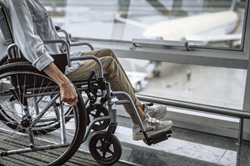
Air travel with disabilities
Consider using the personalized service of a travel agent. Contact: staff@suitevacations.com
TENAFLY, N.J. (PRWEB)
December 11, 2019
Select Flights & Seats Wisely
Schedule a non-stop or direct flight. It’s much less stressful for all travels involved. If you do have to fly on a connecting flight, avoid tight transfers to minimize anxiety. Book a flight for early in the day, since morning flights typically divert or delay less often. If you need more leg room or other accommodations, try to get a note from your doctor and the flight crew may be able to help you.
Tip: If you have special needs or want to maintain full control over your situation, work with a travel agent or a reservation agent with the airline of your choice. They do a lot of the legwork and you can easily confirm that your special requests have been recorded.
Confirm Dietary Needs
Most airlines have standard menu items that meet common dietary needs like gluten-free or vegetarian. However, it’s smart to ask about dietary options when you book your flight, especially for long flights. Purchase healthy snacks, after clearing security.
Request a Wheelchair or Cart
Airlines and airports provide wheelchair assistance from check-in all the way to the gate and even from the gate to baggage claim. There’s no fee, but tipping is advised. This helps you move through the airport faster and without the worry of missing a a flight. Some larger airports have gate-to-gate cart service for connecting passengers who need assistance, so make sure to ask about this service if you’ve got a tight connection or have to change terminals. Make these arrangements when you make your reservation and confirm at check-in.
Tip: Most Airlines have a customer service phone number specifically for making arrangements for special services like wheelchairs.
Check Bags
IIt may cost a little extra, but checking bags is a smart investment. Having fewer things to carry onto the plane can help reduce stress and you won’t have to worry about keeping track of too many things. It’s easier to move around and easier to board and get seated without having to manage large bags.
Tip: Choose a carry-on bag that’s just big enough for your necessities: medications, wallet, tablet or book, and travel documents. Double-check the dimensions for under-seat stowage on each flight. Request assistance when placing the bag in the overhead bin.
Make Security Work in Your Favor
Security can be anxiety inducing for people of all ages, but even more so for seniors with medical devices and mobility aids. You, or your caregiver, can work with the TSA to get a special card that describes an elderly person’s health conditions and disabilities. Showing the card (or a doctor’s note) to a TSA officer entitles you to special consideration, like sitting down in the checkpoint area, and different screening procedures.
Request Early Boarding
When you arrive at the gate, you, or your caregiver, should tell the agent you need a little extra time to get down the jet-bridge and settled into your seat. This is especially important if you have mobility issues or need help hoisting your bag up to the overhead bin.
For information about Suite Vacations, visit: http://www.suitevatons.com
Share article on social media or email:

